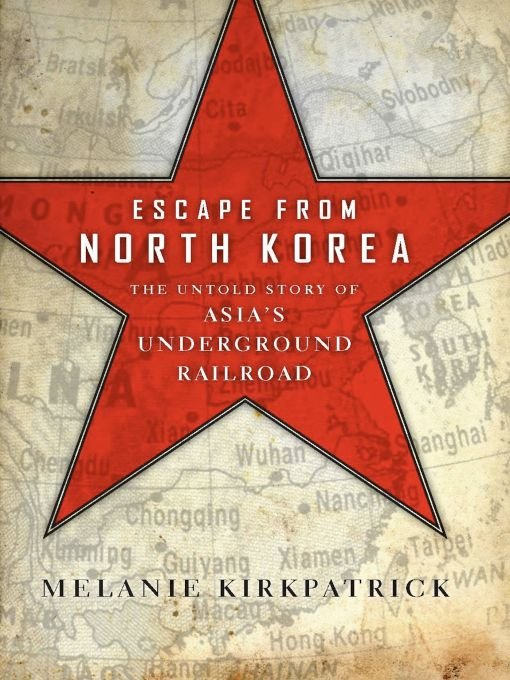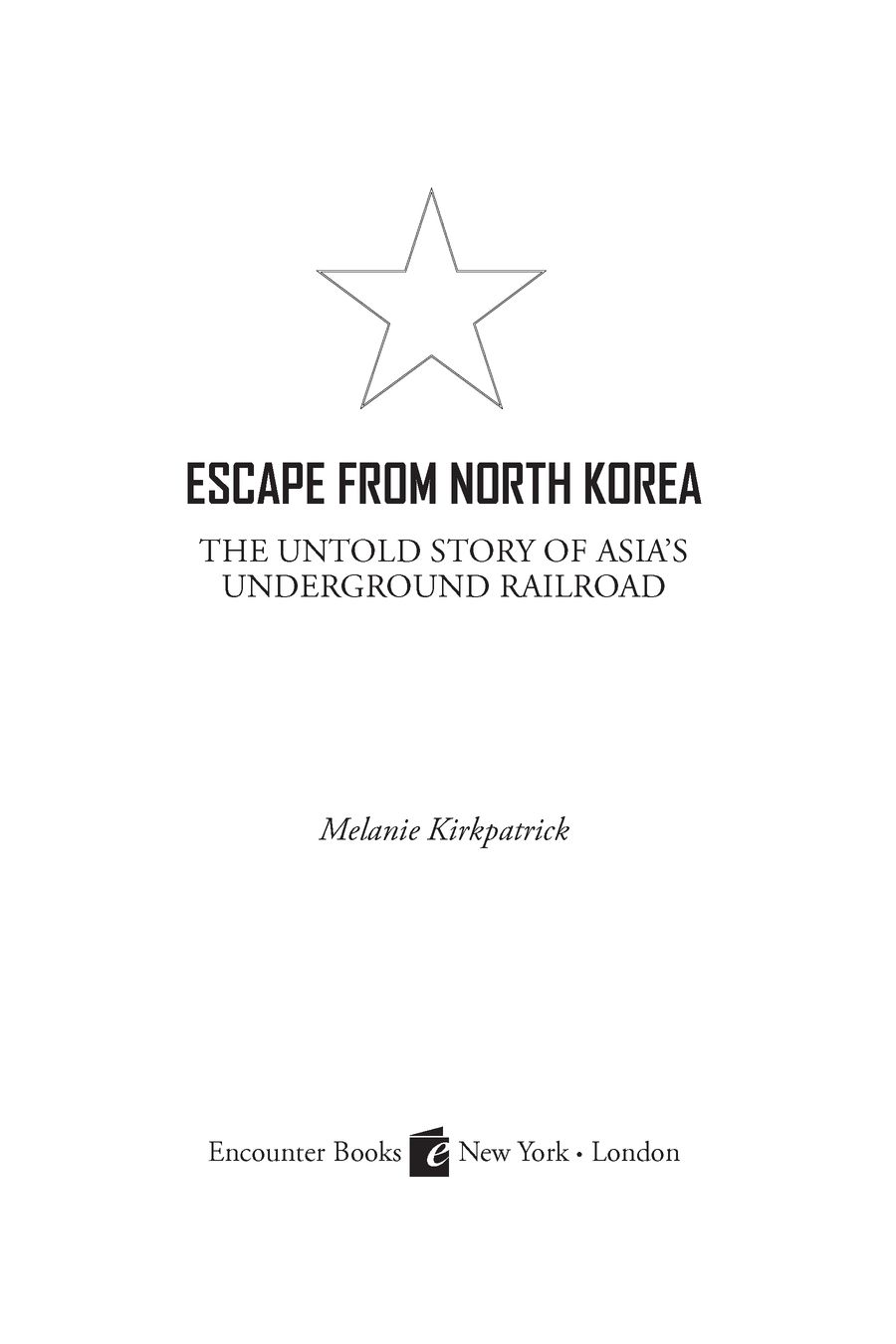Escape from North Korea
Read Escape from North Korea Online
Authors: Melanie Kirkpatrick



Table of Contents
Â
Â
Â
Â
Â
Â
Â
Â
Praise for
Escape from North Korea
Escape from North Korea
“Melanie Kirkpatrick is one of the finest newspaperwomen of her generation, and she has, in
Escape from North Korea
, brought in an astonishing scoopâa story that illuminates how America's own abolitionists, across the centuries and oceans, are inspiring a new underground railroad. Her account reminds us all of why Communist regimes so fear religion.”
Escape from North Korea
, brought in an astonishing scoopâa story that illuminates how America's own abolitionists, across the centuries and oceans, are inspiring a new underground railroad. Her account reminds us all of why Communist regimes so fear religion.”
âSeth Lipsky, editor of the
New York Sun
New York Sun
Â
“
Escape from North Korea
is a troubling and inspiring story of both man's inhumanity to his fellow man and a testimony to the indomitable human spirit in the midst of horrific torture and privation. Melanie Kirkpatrick has done us all a great service by telling this compelling story.”
Escape from North Korea
is a troubling and inspiring story of both man's inhumanity to his fellow man and a testimony to the indomitable human spirit in the midst of horrific torture and privation. Melanie Kirkpatrick has done us all a great service by telling this compelling story.”
âRichard Land, president of the
Ethics & Religious Liberty Commission
Ethics & Religious Liberty Commission
Â
“Kirkpatrick puts the spotlight on one of the greatest tragedies of the postwar world: the transformation of an entire nation into a gulag. But despite the many horrors of North Korea, courage and the human spirit endure. Kirkpatrick's timely book should convince Koreans and Americans of the immediate need to end North Korea's totalitarian dictatorship and unify the peninsula under a free and democratic government.”
âJohn Yoo, professor of law at the
University of California at Berkeley
University of California at Berkeley

FOR JACK

AUTHOR'S NOTE
T
his is a book about personal courage and the quest for liberty. These qualities are embodied in the North Koreans who dare to escape from their slave-state of a nation to the neighboring, but unwelcoming, country of China. They are embodied, too, in Christian missionaries and other humanitarian workers who help the North Korean runaways flee China and reach sanctuary in free countries. They travel along a secret route known as the new underground railroad.
his is a book about personal courage and the quest for liberty. These qualities are embodied in the North Koreans who dare to escape from their slave-state of a nation to the neighboring, but unwelcoming, country of China. They are embodied, too, in Christian missionaries and other humanitarian workers who help the North Korean runaways flee China and reach sanctuary in free countries. They travel along a secret route known as the new underground railroad.
This is also a book about North Korea's future. Through the stories recounted in these pages, the reader will catch a glimpse of the potential of the North Korean people, what they and their country could become if they were liberated. The twenty-four thousand North Koreans who have fled to safety in South Korea (or, in a few cases, North America or Europe) constitute a tiny minority of the country's twenty-four million people. Yet they are the change-makers. They are
a bridge to a free and unified Korea. Through their efforts to reach family and friends they have left behind, the fugitives are opening up their information-starved homeland, exposing their countrymen to liberal ideas, and helping to lay the intellectual groundwork for dissent. The escapees already are beginning to transform their country, and they may eventually replace the totalitarian regime that keeps their fellow citizens in chains.
a bridge to a free and unified Korea. Through their efforts to reach family and friends they have left behind, the fugitives are opening up their information-starved homeland, exposing their countrymen to liberal ideas, and helping to lay the intellectual groundwork for dissent. The escapees already are beginning to transform their country, and they may eventually replace the totalitarian regime that keeps their fellow citizens in chains.
Supreme Leader Kim Jong Eun, North Korea's young new dictator, understands the threat that the escapees pose to his rule. One of his first acts after succeeding his late father, Kim Jong Il, in December 2011, was to issue a shoot-to-kill order to guards along the Sino-Korean border. Anyone observed fleeing across the Tumen or Yalu River to China was to be stopped, he commanded. Kim Jong Eun reportedly also issued orders for the on-the-spot execution of any North Korean arrested in flight.
Through the North Korean escape stories, I also illustrate the effects that policy decisions made in Beijing, Washington, Seoul, and other world capitals have on the men, women, and children who flee North Korea. I pay particular attention to China, whose forced repatriation of the North Koreans living in China is both morally wrong and illegal under international agreements to which China is a party. Beijing deems the North Koreans “economic migrants,” a status that conveniently ignores Pyongyang's savagery against its own people, including the use of economic repression, especially the withholding of essential food supplies, as a tool of political control. China's inhumane repatriation policy also ignores the harsh punishment inflicted upon the North Koreans it sends back against their will.
The principal characters of this narrative are the passengers and conductors on the new underground railroadâthe secret network of safe houses and transit routes that crisscrosses China and transports North Koreans to refuge in bordering countries. The new underground railroad is operated by humanitarian workers, largely Christian, from the United States and South Korea, and it is supported by
thousands of ordinary men and women in China, Christian and not, who are willing to break their country's laws and risk imprisonment to assist the North Koreans. Helping a North Koreanâeven so much as giving him a mealâis a crime in China, punishable by fines, jail sentences, and, in the case of foreigners, deportation after they have served their time in prison. The men and women who rescue North Koreans are acting on the dictum of the eighteenth-century British philosopher Edmund Burke, who warned, “Evil flourishes when good men do nothing.” Enterprising business peopleâboth honest and dishonest in their dealingsâalso are increasingly active along the new underground railroad, where North Koreans can purchase passage with cash or on credit.
thousands of ordinary men and women in China, Christian and not, who are willing to break their country's laws and risk imprisonment to assist the North Koreans. Helping a North Koreanâeven so much as giving him a mealâis a crime in China, punishable by fines, jail sentences, and, in the case of foreigners, deportation after they have served their time in prison. The men and women who rescue North Koreans are acting on the dictum of the eighteenth-century British philosopher Edmund Burke, who warned, “Evil flourishes when good men do nothing.” Enterprising business peopleâboth honest and dishonest in their dealingsâalso are increasingly active along the new underground railroad, where North Koreans can purchase passage with cash or on credit.
My admiration for the North Koreans who escape and for those who help them is my motivation for writing their untold story, but I also cover areas where both groups fall short. In their zeal to spread their faith, religious workers are sometimes too quick to jeopardize their own lives and those of vulnerable North Koreans. In the United States, too many people in the Korean-American community avert their eyes from the depredations of the regime in Pyongyang and the plight of the North Koreans in China; they fail to use their political clout in Washington on behalf of their fellow Koreans. South Koreans too often treat the North Koreans who settle in their country as strangers rather than brothers.
As for the fugitives themselves, when North Koreans finally reach safety in a third country after surmounting great odds, they can have a difficult time learning to be free. The survival skills that characterize the refugee's life on the run do not necessarily translate into coping skills in an open, modern society. Even though many North Koreans succeed in their new homes, and some do so spectacularly, others are not up to the task.
I first came to this subject when I was a journalist at the
Wall Street Journal,
a newspaper whose editorial philosophy is summed up by its unofficial credo: free markets and free people. At the
Journal
, I
had the opportunity to interview many of the heroes of freedom in our time. They were men and women who fought the evils of totalitarianism at great personal risk. Among them were Natan Sharansky and Vladimir Bukovsky of the Soviet Union, the Dalai Lama of Tibet, Lech Walesa of Poland, Fang Lizhi of China, Mart Laar of Estonia, and Martin Lee of Hong Kong. These are figures of international prominence, people whose deeds have been in the headlines, who have written books, and, in a few cases, who became leaders of the countries they helped liberate.
Wall Street Journal,
a newspaper whose editorial philosophy is summed up by its unofficial credo: free markets and free people. At the
Journal
, I
had the opportunity to interview many of the heroes of freedom in our time. They were men and women who fought the evils of totalitarianism at great personal risk. Among them were Natan Sharansky and Vladimir Bukovsky of the Soviet Union, the Dalai Lama of Tibet, Lech Walesa of Poland, Fang Lizhi of China, Mart Laar of Estonia, and Martin Lee of Hong Kong. These are figures of international prominence, people whose deeds have been in the headlines, who have written books, and, in a few cases, who became leaders of the countries they helped liberate.
In researching this book, I interviewed many North Koreans who fled their country, including, in 2006, members of the first tiny group of refugees to arrive in the United States. In contrast to the internationally prominent heroes of freedom mentioned above, the North Korean freedom-seekers and their rescuers are mostly invisible. This book is an effort to make their stories known and, in some cases, their names as well. I say “some” because many of the North Koreans I spoke to asked that their names and other identifying information be kept secret in order to protect loved ones back home. The regime in Pyongyang practices collective punishment. Fathers and mothers, brothers and sisters, aunts and uncles, sons and daughters are punished for the supposed crime of a relative.
Many of the Christians and humanitarian workers prefer anonymity, too, out of a concern that publicity would jeopardize their rescue work. A number of the government officials with whom I spoke also asked for confidentiality, in the belief that public statements could hamper their country's diplomatic efforts on behalf of the North Korean refugees. If anyone I interviewed asked me to keep his name confidential, I have honored that request. In the course of researching this book, I have interviewed more than two hundred people in South Korea, China, Japan, Southeast Asia, and the United States. They include dozens of North Koreans, as well as Christian missionaries, humanitarian workers, community leaders, military officers, government officials, and scholars.
Other books
A Different Christmas (University Park #5) by C.M. Doporto
How You Take Me by Natalie Kristen
Moonshine by Thurman, Rob
Drive Me Wild by Christine Warren
Kate Gosselin's Love Is in the Mix by Kate Gosselin
The Tortoise and the Dare by Terry Deary
The Scourge (Kindle Serial) by Roberto Calas
East of the Sun by Julia Gregson
Morse's Greatest Mystery and Other Stories by Colin Dexter
The Dead Don't Get Out Much by Mary Jane Maffini
